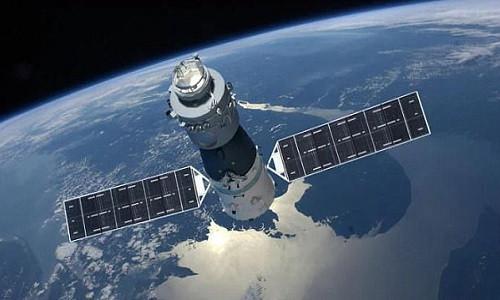Chinese space station falling to Earth faster and faster
Debris weighing 100 kg from China's Tiangong-1 space station could fall to Earth, causing serious damage if it hits a residential area.
 |
| Tiangong-1 space station in Earth orbit. Photo: CMSE. |
Experts predict China's 8.5-tonne Tiangong-1 space station will crash to Earth between October 2017 and April 2018 after the Chinese space agency lost control of the station in September 2016, Independent reported yesterday.
Worryingly, experts don't know exactly where the spacecraft will fall or where the debris will land. The station's orbit is still falling, and in recent weeks it has begun to fall faster.
"Currently, the station's closest point to the Earth is less than 300 km above the ground and the station is in a dense atmosphere. The speed of the station is getting faster and faster. I predict the station will crash in the next few months, around the end of 2017 or early 2018," said Dr. Jonathan McDowell, an astrophysicist at Harvard University.
Tiangong-1 space station performed a docking mission with a spacecraft in 2013. Video: YouTube.
China's space agency is monitoring the Tiangong-1 space station and said it would issue a warning if there was a risk of collision. "It would be bad if debris from the spacecraft fell into a residential area, but it's also possible it could fall into the ocean or an uninhabited area," said Thomas Dorman, an amateur satellite tracker.
Most of the space station will burn up in the atmosphere as it falls back to Earth. But Dr. McDowell stressed that some parts could weigh as much as 100kg when they hit the Earth's surface, causing extensive damage. He said people might only have a few hours' warning of where the space station would fall.
Tiangong-1 was launched in September 2011. It is the basis for China to create a larger space complex operating in Earth orbit by 2020. The spacecraft has carried out several docking missions, including the unmanned Shenzhou-8 mission in 2011 and the manned Shenzhou-10 mission in 2012.
According to the China Manned Space Engineering Office (CMSE), Tiangong-1 is equipped with Earth observation and space environment instruments. CMSE said Tiangong-1 has collected a large amount of valuable scientific data in mineral resources, ocean and forest research, ecological and aquatic environment monitoring, land use, geothermal energy and disaster control.
According to VNE
| RELATED NEWS |
|---|

